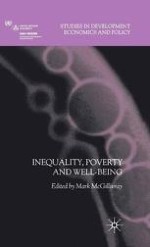2006 | OriginalPaper | Buchkapitel
The Human Development Index Adjusted for Efficient Resource Utilization
verfasst von : F. J. Arcelus, Basu Sharma, G. Srinivasan
Erschienen in: Inequality, Poverty and Well-being
Verlag: Palgrave Macmillan UK
Aktivieren Sie unsere intelligente Suche, um passende Fachinhalte oder Patente zu finden.
Wählen Sie Textabschnitte aus um mit Künstlicher Intelligenz passenden Patente zu finden. powered by
Markieren Sie Textabschnitte, um KI-gestützt weitere passende Inhalte zu finden. powered by
The human development index (HDI) developed by the United Nations Development Programme (UNDP 2003) is computed as the average of three equally weighted outcome measures or indices of human development: life expectancy (LI), educational attainment (EI) and income (WI). However, this computational process is independent of the resource endowment being devoted by each country to the achievement of the three outcome levels (Raab et al. 2000). Hence, it is conceivable that two different countries consume vastly different amount of resources in achieving the same, say, LI, whereas this difference in the efficiency of resource utilization is not reflected in the HDL The purpose of this chapter is to address this efficiency issue. Here, the term efficiency corresponds to the concept of Pareto-Koopmans efficiency in economics (Varian 1999). Thus, it measures the ability of each country to transform the minimum possible units of its own resources into the maximum possible levels of the three outcomes. As a result, a country or decision-making unit (DMU) ‘is fully efficient if and only if it is not possible to improve any input or output without worsening some other input or output’ (Cooper et al. 2000: 45). This definition is operationalized through the development of a benchmarking model, where each country’s three HDI outcome measures, LI, EI and WI, are evaluated relative to an efficient or ‘best-practice’ production frontier, formed by the benchmarking (that is, most efficient) countries.
